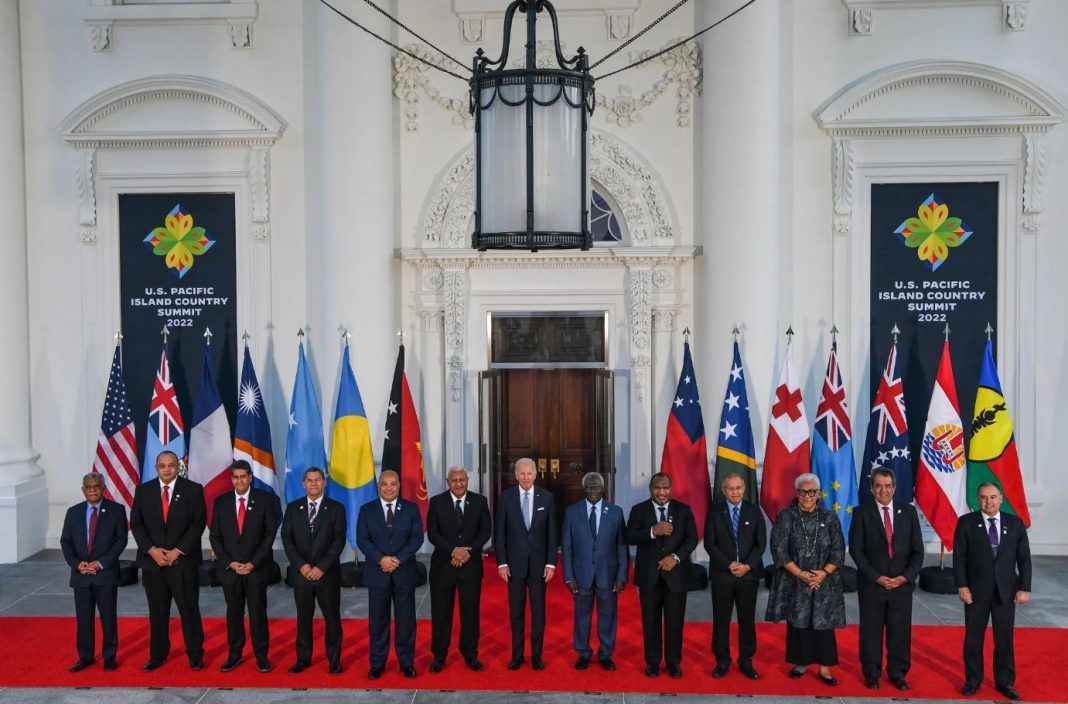At a meeting held in Washington on Thursday, the United States and 14 Pacific Island countries inked a wide cooperation pact, placing climate change, economic development, and greater security connections at the core of an American attempt to offset Chinese influence in the area.
During a discussion with island leaders, President Biden said that a significant portion of the history of our global community is going to be written in the Indo-Pacific over the next few years and decades. He continued by saying that the safety of the United States of America and the rest of the globe is contingent not only on your safety but also on the safety of the Pacific Islands.
His remarks, along with the promise of increased funding and cooperation from the United States, reflected a realisation that has only recently become more urgent in Washington: that China has made significant inroads in the island chains of the North and South Pacific, where thousands of Americans fought and died during World War II, and that the United States needs to catch up. His comments and promise of increased funding and cooperation from the United States reflected this realisation.
The meeting that is taking place this week was first announced not long after the Solomon Islands inked a security contract with Beijing in April. This arrangement opened the door for China to train local law enforcement and provided a potential foothold for Chinese security troops.
Despite the fact that the sensitivities around China’s foreign policy aims still appeared to linger over the Washington summit, that accord may wind up being a high-water mark for China, which is seen more sceptically across the Pacific than it was just a few years ago.
It was first reported that Manasseh Sogavare, the Prime Minister of the Solomon Islands, would not sign the cooperation deal. This was seen by some as a concession to Beijing on Sogavare’s behalf. It wasn’t until a paragraph that mentioned Taiwan, an island democracy that China considers to be a renegade province, was removed from the draught that his signature and those of the other leaders were able to be included on the proclamation.
During briefings, officials from the White House said that the United States was committed to engaging in discussion with countries in the area about the complex problems that were at play. They stressed the fact that the summit had provided more collaboration prospects and pledges in addition to the recent promise of three new American embassies, which would be located in Tonga, the Solomon Islands, and Kiribati respectively.
According to a fact sheet supplied by the White House, the United States will spend more than $810 million in expanded initiatives for the Pacific Islands. This amount is in addition to the more than $1.5 billion that has been contributed over the course of the previous decade.
A large portion of the money would be used for climate resilience and maritime security, including a request to Congress for $600 million connected to an ancient fisheries treaty that permits the United States to harvest tuna in the seas of the South Pacific.
But in addition to that, there are a few fascinating extras included in the package, such as a gift of $20 million to the Solomon Islands for the development of tourism, $3.5 million for digital connection in the nation, and $2.8 million for FBI-led law enforcement training.
The assistance for law enforcement that was at first planned to be provided to three Pacific Island countries will now be provided to six of these nations: the Federated States of Micronesia, the Marshall Islands, Palau, Papua New Guinea, Vanuatu, and the Solomon Islands.
Volunteers with the Peace Corps will also return to the countries of Fiji, Tonga, Samoa, and Vanuatu. In addition, other nations are being explored for participation in the programme. According to the White House, the United States is also involved in bilateral discussions with Fiji on a military cooperation pact, and it will shortly begin talks with Papua New Guinea. Both of these processes are considered to be in the early stages.
The conference seems to have satisfied the vast majority of the region’s leaders. Since he took power in China over ten years ago, Xi Jinping has rolled out the proverbial crimson carpet for visiting heads of state from the Pacific region. The charm offensive that Biden was putting on seemed to be less formal.

